How scared should you be of your 1 star reviews?
Published 22nd April, 2015 by Claire McGregor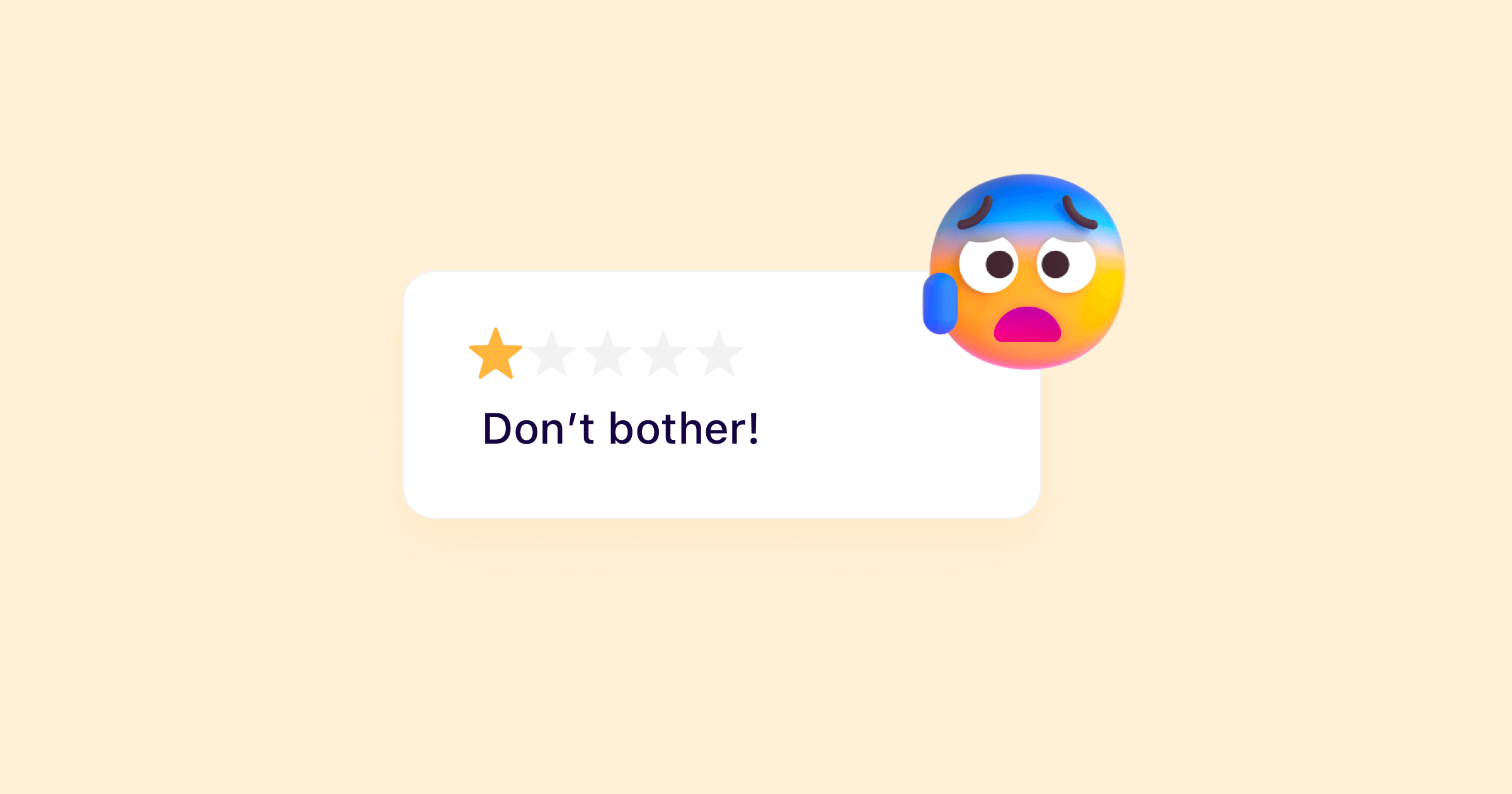 It's well established that apps with a star rating lower than four stars have a decreased likelihood of being featured. When an app rating is low this indicates to stores that the app has issues to be resolved before it can be featured confidently.
It's well established that apps with a star rating lower than four stars have a decreased likelihood of being featured. When an app rating is low this indicates to stores that the app has issues to be resolved before it can be featured confidently. In this overview you'll learn:
- Is there a relationship between review volume and star rating?
- Our analysis: Review Volume vs Average Star Rating
- The results: High volume apps also have higher ratings
- So why do apps with high review volume have higher ratings?
- In summary...
Want to level-up your app store review analysis?
Try Appbot free now, no credit card needed →Here at Appbot, we are often focussed on helping customers who are getting a large volume of negative reviews shift their average star rating upwards. As a team we've all dealt with the fear of negative reviews either for our own apps, or those of the businesses we've worked for, but is the risk of a deluge of negative reviews as real as it seems?
Is there a relationship between review volume and star rating?
We were keen to figure out whether there's a relationship between review volume and average star rating - do users prefer to leave positive feedback or is the perceived risk of negative reviews in the app store real, with many apps that get low average stars (2 or lower) also getting a big volume? If you release a version users don't like, are they as inclined to hate on you in reviews as they are to sing your praises when the opposite happens?
We guessed that apps at each end of the average star rating scale would get more reviews than apps with 2.5-3.5 average stars, but the results surprised us. Here's the details of our study…
Our analysis: Review Volume vs Average Star Rating
We analysed 10,000 apps from our database that had received at least 1 review in the iOS App Store in the past 30 days. Here's how the average star ratings were distributed:
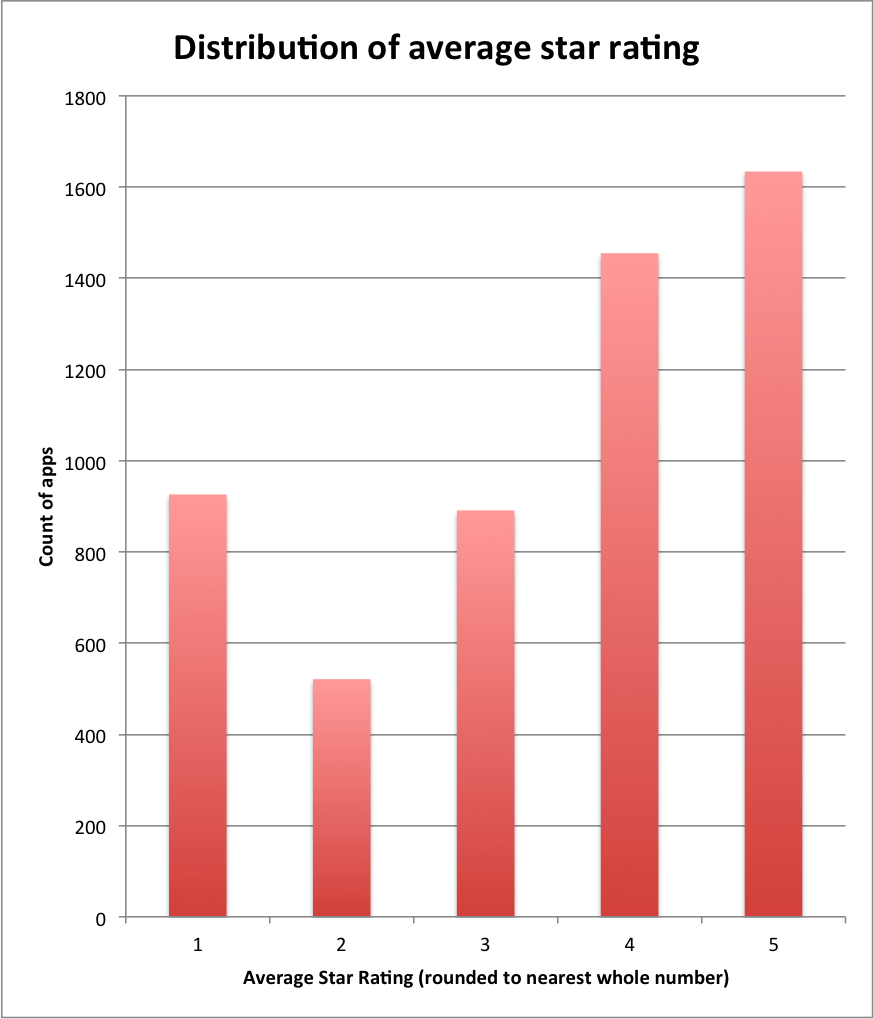
Hmm, OK. The count of apps averaging 1 star isn't as high as we'd guessed it might be - the count of 3-star apps is almost identical. Having said that, we've rounded to the nearest whole number in this chart, so apps with an average of 1 had an average of between 1.0 and 1.49, whereas apps with an average of 3 had an average of 2.5-3.49. With that in mind the count of apps getting 5 is definitely higher than we expected - these apps averaged 4.5-5.0. Next, we looked at how the average star rating stacked up when we added the review volume into the mix. We plotted each app as a point on this scattergraph:
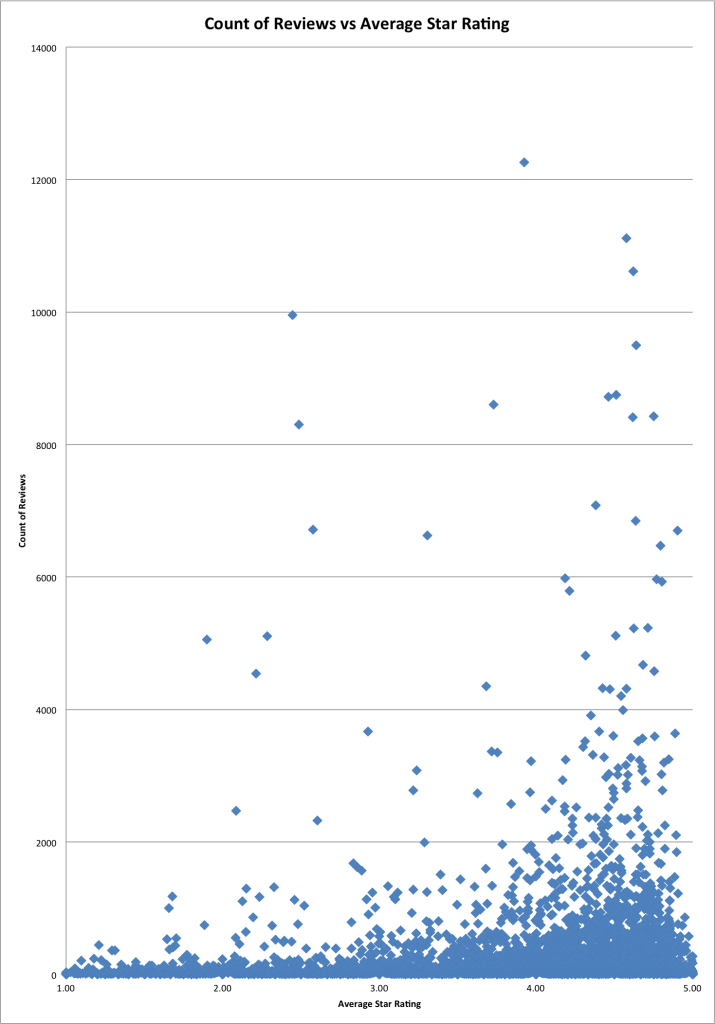
As we mentioned earlier, the sample size is 10,000 apps. The number of reviews per app over the 30 day period ranges from 1 to 12,262. The average count of reviews per app is 129. The average star rating per app is 3.19 stars.
The results: High volume apps also have higher ratings
Happily, there is a strong correlation between number of reviews and average star rating: the apps with a higher review volume also trended towards a high average star rating.
Not only that, the apps with crazy-high review volumes were significantly more likely to have high star ratings. In fact, there was only a single app with ‹2 star average and more than 5,000 reviews in the period.
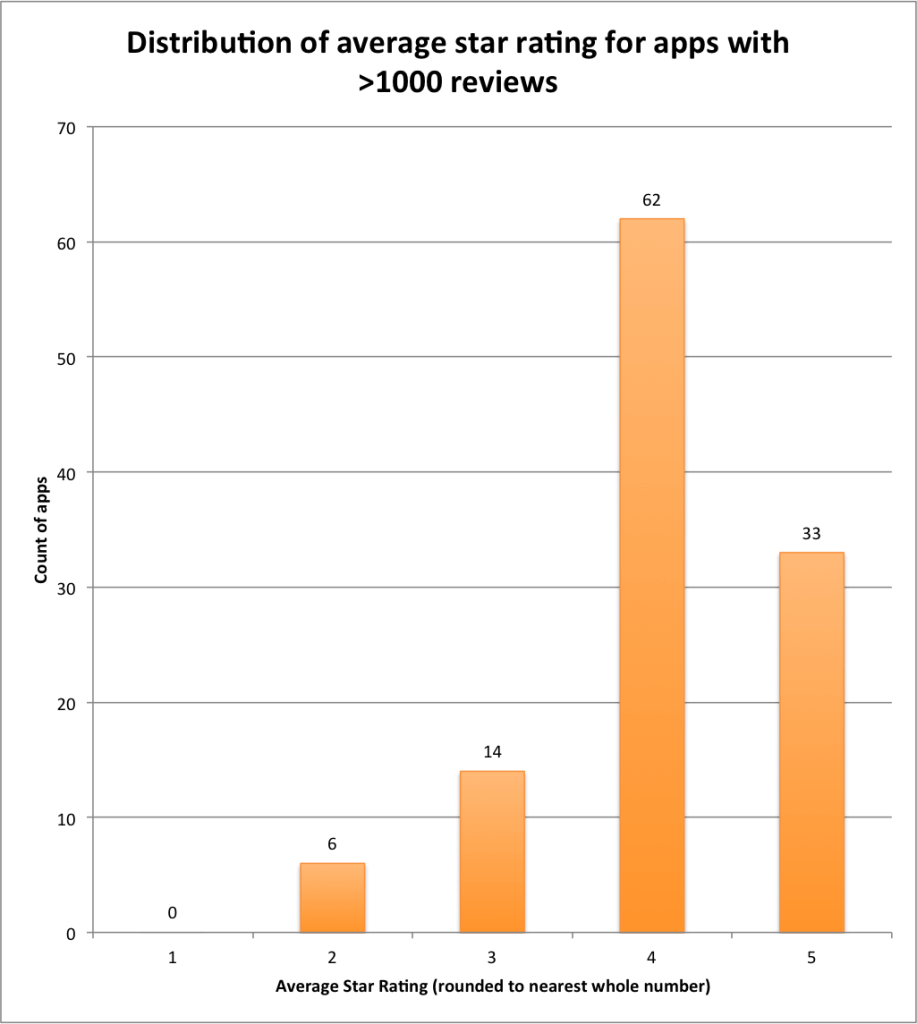
Compare this chart to the earlier one referencing the whole sample - note that in this sample of apps that received >1000 reviews (296 apps) in the period there were ZERO that received an average 1 star rating (1.0-1.49), and only 6 with 2 stars (1.5-2.49). If we look at a scattergraph of only those same 296 apps this is what we see:
There are a few other apps on this chart that are really suffering (marked Ouch), but they're in the overwhelming minority. Without naming names, these apps are getting so much negative feedback from users because earlier versions were loved by users but the company has removed a much-loved feature or significantly altered the UI, or because they support a very large (predominantly offline) business and fall short of that business' customers' expectations, or both. It seems that runaway volumes of negative reviews is really only a major risk if you have a large customer base, and you're not paying attention to what those customers want.
The results make a lot of sense when you think them through. Here are a few of the reasons we believe that apps getting high volumes of reviews tend to get higher average star ratings:
So why do apps with high review volume have higher ratings?
We have some hypotheses about why this might be the case:
- People only really tell others about apps they LOVE - When was the last time someone said to you “Hey, you've gotta download this really crap app!”? That's right, never. Large volumes of positive reviews create a snowball effect - positive word of mouth offline, positive word of mouth online. Large volumes of negative reviews are only really a risk if you already have a huge customer base, and you're either falling very far short of their standards or making a change to your existing app that they might hate. Conversely, positive feedback has a snowball effect. Josh Pigford (@Shpigford) from baremetrics wrote a really great piece that highlights this - highly recommended reading.
- Positive feedback culture - At the risk of sounding like my Mum, social media really focusses on the mantra “If you can't say something nice, don't say anything at all”. There's no “hate” or even “dislike” button on Facebook, Instagram, Pinterest, Twitter…. We've been conditioned to engage positively, and it takes serious aggravation to make us behave otherwise.
- Smart developers know how and when to ask for reviews - Smart review workflows are becoming more commonplace, and if you're not already using them you might be interested to check out our Chief Bot, Stuart's, post on Medium recently about his experiences with 7 Minute Workout app - they can have a massive impact on your average star rating. Smart review workflows focus on only asking for a review when you've qualified that the potential reviewer is feeling positive about your app.
In summary...
Smart people are always cautious, so it wouldn't be reasonable to expect all of us to cast our 1-star review phobias aside as a result of this little study, but the evidence seems to suggest the risk is lower than you might think. Exercise extra caution if you have a big user base already (not just in the app itself - if you have an existing business with a large customer base that you'll be promoting your app to then you should also be very careful, and always test the response with a subset of customers first). The other encouraging thing to come out of this little study is that if you're getting positive reviews, you can probably push harder for a greater volume of reviews without too much fear that your average star rating will fall, so if you're already getting a lot of star love get cracking on those social shares and review workflows and watch the downloads flow.
If you enjoyed this, please hit share on your social networks of choice. We'd love to hear your feedback on this data so please tweet your comments to @AppbotX.
Want to level-up your app store review analysis?
Try Appbot free now, no credit card needed →Where to from here?
- Learn how to improve app reviews and skyrocket your app's success.
- Level up your app's reputation with proven strategies to get better reviews from satisfied users.
- Streamline your app review management process and take control of your app's feedback loop.
- Explore the world of addictive apps and learn how to create irresistible experiences for your users.
- Stay informed and in control of your app's reputation with Appbot's comprehensive app review monitoring tool.
About The Author

Claire is the Co-founder & Co-CEO of Appbot. Claire has been a product manager and marketer of digital products, from mobile apps to e-commerce sites and SaaS products for the past 15 years. She's led marketing teams to build multi-million dollar revenues and is passionate about growth and conversion optimization. Claire loves to work directly with the world's top app companies delivering tools to help them improve their apps. You can connect with her on LinkedIn.
Enjoying the read? You may also like these
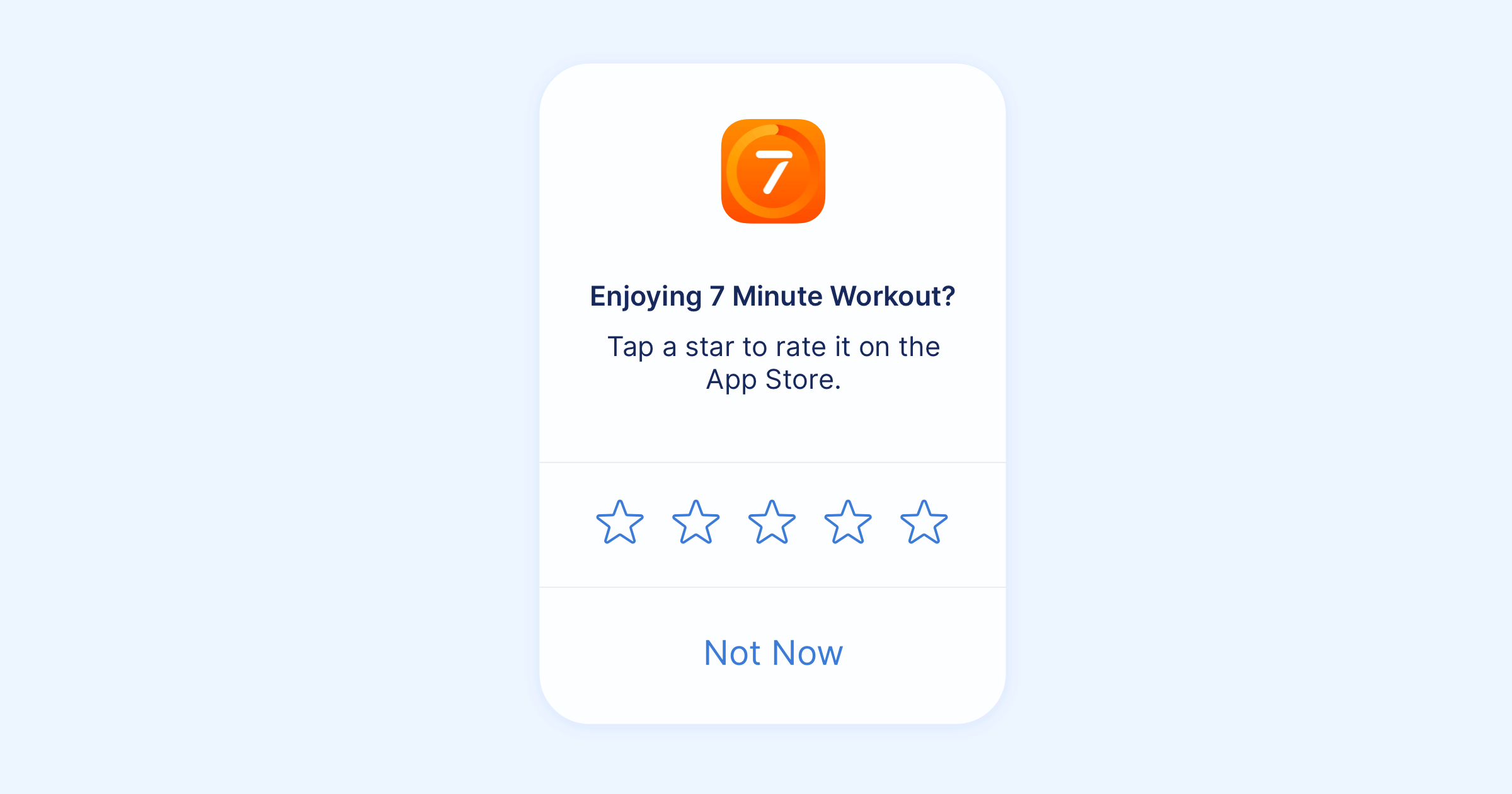 Prompting for app reviews and ratings on iOS and Android
Prompting for app reviews and ratings on iOS and Android Want to learn WHEN to prompt an app review? See our advice after talking to thousands of mobile app developers on best techniques for IOS and Android apps.
Are App Store subscriptions better than one-off in-app purchases? Read about our subscription pricing experiments to the first $1k in MRR.
Excellence in app store review management is key when it comes to making apps more useful, beautiful & profitable. See our tips to manage reviews effectively.
Your app or game name is one of the most difficult, but also most important, decisions you will make.


